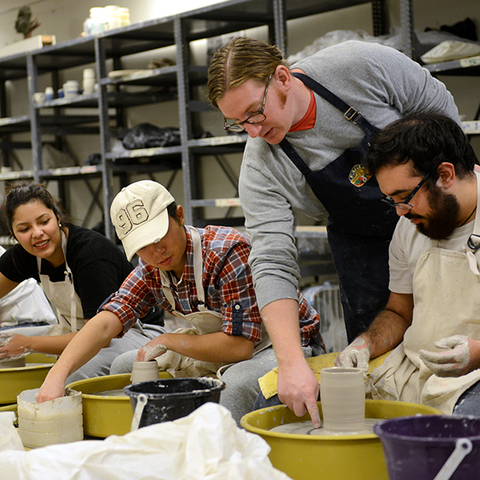
In Visual Arts courses, faculty and students work together in a professional and creative learning environment. The Bachelor of Arts curriculum allows students to tailor a course of study suited to their professional and personal ambitions. Students have the option to focus their studies in one media area or sample a broad range of art and design perspectives. Visual Arts offers a variety of courses in the areas of painting, drawing, printmaking, ceramics, sculpture, graphic design, digital media, photography, and art history. Students can also minor in Visual Arts, Art History, and Art Therapy.
Art Students League
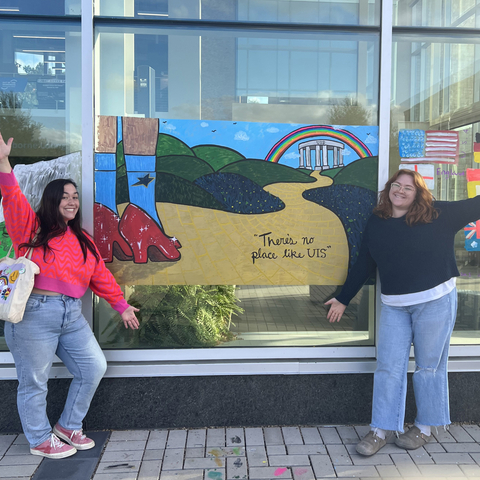
The Art Students League (ASL) hosts art events for student life, organizes field trips to local and regional exhibits, supervises the Access Gallery in the Visual and Performing Arts Building, and coordinates fundraisers benefiting Visual Arts Students. For more information or to be added to our e-mail list, visit the ASL bulletin board located in VPA or contact any ASL officer. They believe in the cultivation and development of awareness and importance of art through each individual difference to enrich our campus environment and surrounding community.
Follow the ASL!
Advising
Our Program Advisor, Craig McFarland, meets with students to make a plan of study. Students are urged to consult their advisor before registering each semester, particularly before registering for the last semester of classes. These meetings outline requirements for graduation and ensure the student has planned his/her schedule to take all necessary courses in order to graduate on time. Visual Arts students are assigned a faculty advisor upon declaration of the Visual Arts major during their time in ART 301 Entrance Assessment. Faculty advisors work with students to ascertain career goals and to assess preparation and deficiencies.
Our Faculty
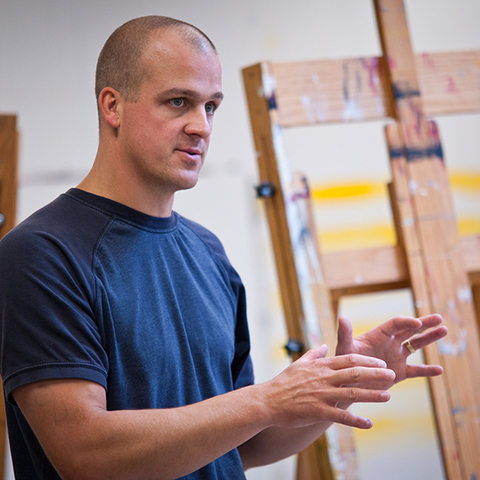
Visual Arts faculty consists of experienced educators and artists dedicated to sharing their knowledge and expertise with students in a collaborative environment. Faculty includes artists working in ceramics, sculpture, painting, drawing, photography, graphic design and digital media. Please feel free to contact a faculty member directly about your visual arts interests. Biographical information is available for each faculty member through the Faculty and Staff link.
Advising Guides
Visual Arts B.A.
- Visual Arts 4 Year Undergraduate
- Visual Arts 4 Year CAP Honors Undergraduate
- Visual Arts 2 Year Transfer with Associates in Art
- Visual Arts 2 Year Transfer No Art Prerequisites
Visual Arts B.A. with Art Therapy Minor
- Visual Arts with Art Therapy 4 Year Undergraduate
- Visual Arts with Art Therapy 4 Year CAP Honors Undergraduate
- Visual Arts with Art Therapy 2 Year Transfer with Associates in Art
- Visual Arts with Art Therapy 2 Year Transfer No Art Prerequisites
Equipment Checkout
Our Facilities
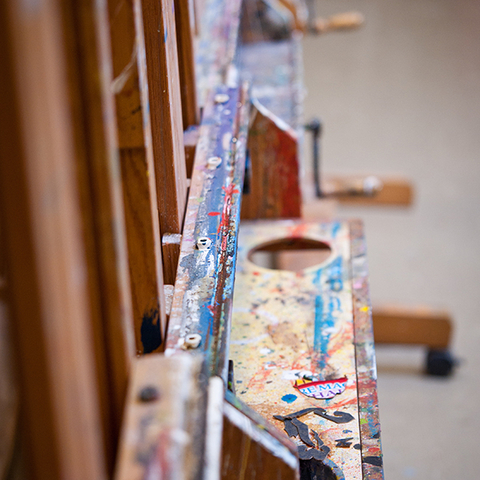
The Visual Arts program is located in the Visual and Performing Arts Building and provides several Student Resources. This facility offers numerous classrooms equipped with whiteboard technology; a ceramics lab; a printmaking lab; studios for drawing and painting; a sculpture lab complete with tools; a Macintosh computer lab with graphic design, animation, and 3D modeling programs; a printing lab; and two photography studios. Additionally, the Visual Arts program maintains a photography classroom and darkroom within the Human Resources Building.
- dSLR Canon Rebel XT
- dSLR Canon EOS 20D
- dSLR Nikon D40
- dSLR Nikon D50
- film SLR Nikon N8008s
- film SLR Nikon N90s
- film SLR Canon AE-1
- phone tripod holders
- tripods
- reflectors
- hot light kits
Safety Procedures for Studios
General
- The responsible faculty member will establish rules for eating and drinking in the studio. These rules must be always followed. No exceptions!
- Proper decorum is essential. Practical jokes or goofing around is not acceptable.
- Never block exits. Aisles must be kept open and emergency equipment, eyewashes, and safety showers must always be accessible.
- Use materials and equipment only for their intended purpose or as directed.
- Always ask for assistance if there are any questions about proper procedures or safety.
- Notify the faculty member if an injury, spill, or any unexpected event occurs.
- Notify the faculty member if symptoms of exposure to hazardous material are experienced.
- Visitors are permitted only under the direct supervision of a faculty member.
Protect Yourself and Your Belongings
- Bring only required materials into the workspace. Leave coats, books, and other unnecessary materials in the designated area.
- Scarves must be removed prior to entering the studio.
- Wear closed toe shoes. Bare feet, sandals, flip-flops, and perforated shoes are not permitted.
- Loose clothing and long hair should be confined.
- Contact lenses may exacerbate eye injuries. It is best not to wear them when there is a potential for exposure to vapors, dust, or splashes.
- Know the location of safety equipment.
- Avoid direct contact with any hazardous substance.
- Use protective equipment and apparel as appropriate or as directed by the faculty member.
- Inspect the equipment before use. Replace equipment that becomes damaged, worn or contaminated immediately.
- Wash hands and exposed skin on arms before leaving the studio.
Reduce Hazards
- Keep all work areas free of clutter and obstructions.
- Ensure that all containers are labeled. Lids should be closed when containers are not in use.
- Materials should only be used as intended by the manufacturer. A faculty member must be directly involved if different uses or treatments of materials are contemplated.
- A faculty member must be available when working with open flames or heat guns.
- Inspect all power tools prior to use. Do not use damaged tools.
- Kilns, presses, power tools, and other specialized equipment must be used only by individuals instructed in proper operation or under the direct supervision of properly instructed individuals.
- Work with solvents must be performed only in designated areas.
- If breakage or spills occur, take appropriate steps to ensure the safety of all. Contact the proper authority while ensuring no one enters the area.
- Clean area when work is finished. Ensure that equipment is disconnected and stowed. Store all chemicals properly.
- Follow instructions for the management of waste. Never dispose of any material in the sink unless a faculty member has indicated that this is acceptable.
- If unsure about safe methods for conducting an activity, ask a faculty member.
Local Art Venues
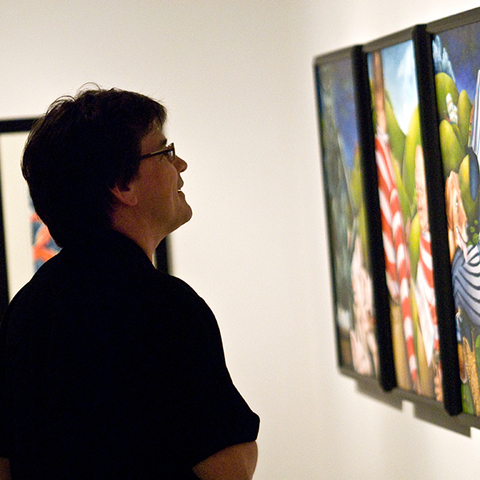
The department extends learning beyond the classroom and studios by sponsoring exhibitions in the UIS Visual Arts Gallery located on the second floor of the Health and Sciences Building. Students attend openings and workshops and gain experience in viewing works by a variety of local, national and international professional artists. Graduating students will present their senior exhibitions in the gallery.
- James S. Murray Gallery (LLCC)
- Hoogland Center for the Arts
- The Pharmacy Gallery & Art Space
- Springfield Art Association
- Dim Art House
- Creative Reuse Marketplace
- Springfield Old Capitol Art Fair
- Illinois State Museum
News Archive
- March 2021: Visual Arts Gallery Presents Faculty Exhibition
- January 2021: Visual Arts Gallery Presents “Duet,” a Mixed-media Exhibit
- April 2020: “Hindsight 20/20” Virtual Exhibition Showcasing Senior Artwork
- February 2020: “Convergence,” an Exhibition by Shane Harris
- January 2020: “To Unmake a Fold,” Exhibition Featuring Chicago-based Artists
- November 2019: Visual Arts Gallery Silent Auction and Benefit Exhibition
- October 2019: “Her Name Escapes Me,” an Exhibition by Hương Ngô
- September 2019: “Value Added,” an Exhibition of Mixed-media Sculptures
- August 2019: “Tectonic Soliloquy,” an Immersive Mixed-media Installation Exhibit
- April 2019: Multiple Exhibits Featuring UIS Students and Alumni Work
- March 2019: “The Magnificently Mundane,” a Curatorial Walkthrough
- February 2019: Bjorngaard Curates Group Exhibition of Graphic Art
- January 2019: “Pleasure Comes in Halves,” a Mixed-media installation by Thaddeus Kellstadt
- November 2018: Annual Silent Auction and Benefit for Visual Arts Gallery
- October 2018: New Exhibit, Speaker Series About Exploration of Race in Art
- September 2018: “Let the fancy,” a Group Exhibit
- August 2018: “digital dusk shadow storage” a new Installation by Artist Amanda Bowles
- May 2018: Allyson Packer Summer Enos Park Artist-in-Residence
- April 2018:“Essence” to Feature Graduating Students Work
- February 2018: “Leaving Loves Company” Exhibit by Angela Ellsworth
- January 2018: UIS Visual Arts Gallery presents “Hold me” by Chicago artist Erin Hayden
- November 2017: UIS Visual Arts Gallery to hold silent auction fundraiser featuring local and regional artists
- October 2017: UIS Visual Arts Gallery presents “of strange shadows” from Texas-based print collaborators Leslie Mutchler and Jason Urban
- September 2017: UIS Visual Arts Gallery presents “Live Through This” by photographer, writer and suicide awareness activist Dese’Rae L. Stage
- August 2017: UIS Visual Arts Gallery launches a new season with the 2017 Faculty Exhibition
- June 2017: UIS Visual Arts Gallery presents “Walking Enos Park: Who is your neighborhood?” by Astrid Kaemmerling
- April 2017: UIS Visual Arts Gallery senior exhibition “Lunchables” presents food for thought
- February 2017: UIS Visual Arts Gallery exhibit “Safe Harbor: Work by Diaz Lewis” spotlights immigration reform.
- January 2017: The UIS Visual Arts Gallery presents “Oblique Frontiers” from artist Tyler Lotz.
- November 2016: UIS Visual Arts Gallery to hold silent auction fundraiser.
- October 2016: The UIS Visual Arts Gallery presents “Mirror|Mirror” by alumni Stanley Bly and Amanda Greive.
- September 2016: UIS Visual Arts Gallery presents “Reserved For Loitering” by artist Paul Shortt.
- August 2016: UIS Visual Arts Gallery presents “Avez Vous un Crayon?” by St. Louis artist Lyndon Barrois Jr.
- May 2016: Ten UIS students to present at U of I Undergraduate Research Day at the Capitol.
- January 2016: UIS Visual Arts Gallery presents “TROPICALAMERICAN” by artist Edra Soto.
- November 2015: UIS Visual Arts Gallery Silent Auction features artwork by local and national artists in November.
- October 2015: UIS Visual Arts Gallery presents “Strange Matter.”
- October 2015: Internationally renowned artist and critic Buzz Spector to deliver artist talk at UIS.
- September 2015: Artist Eric J. Garcia to speak at UIS and present exhibition during Hispanic Heritage Month.
- August 2015: UIS Visual Arts Gallery presents “Let the Words Fall Out” by Springfield artist Brytton Bjorngaard.
- April 2015: UIS Visual Arts Department seniors present two distinct art and design exhibitions.
- March 2015: UIS Visual Arts Gallery presents “BIO-fied: Perspectives on Genetic Engineering”.
- February 2015: UIS Visual Arts Gallery to feature Decatur artist.
- January 2015: UIS Visual Arts Gallery presents “Awkward & Urgent Objects” by Chicago artist Kelly Kaczynski.
- December 2014: UIS Visual Arts Gallery Silent Auction features artwork by local and national artists in December.
- October 2014: UIS Visual Arts Gallery presents “Copy Shop”, an exhibition of 3D printed & digitally fabricated objects.
- September 2014: Visual Arts Gallery presents group exhibition featuring over 30 national artists.
- August 2014: Visual Arts Gallery begins Season with “Filler” exhibition by Springfield native Jeff Robinson.
- April 2014: UIS students, including Visual Arts Major Robert Elmers IV, to present their research at the Illinois State Capitol.
- March 2014: Student Arts & Research Symposium gives students a chance to showcase their work.
- February 2014: Visual Arts Gallery presents “Sup?” featuring the work of Brooklyn-based artist Sean Fader.
- January 2014: Visual Arts Gallery presents “Paintings” featuring the work of local artist Kevin Veara.
- November 2013: Visual Arts Gallery hosts annual Silent Auction Benefit featuring original works of art.
- September 2013: Visual Arts Gallery hosts “New Springfield” exhibit inspired by Vachel Lindsay.
